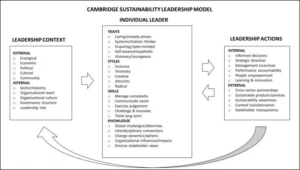Sustainable Leadership: Exploring the Characteristics and Impact of Sustainable Leaders in Organizations

In facing global challenges, the concept of leadership continues to evolve, including the crucial need for sustainable leaders—leaders who prioritize sustainability. The 2021 EY Global Institutional Investor Survey revealed that 74% of investors would shift their investments away from companies with poor sustainability performance. This underscores the demand for leaders who are more aligned with sustainability principles. This approach plays a critical role in attracting investment and maintaining long-term business sustainability. But what exactly is ‘sustainable leadership’? Is it a new concept?
Sustainable leaders have characteristics that differ from traditional leaders, focusing on creating long-term value that goes beyond mere financial gain. These leaders are visionary, with the ability to envision a sustainable future, committed to ethical practices, social responsibility, and reducing environmental footprints. Their leadership is based on the understanding that business prosperity cannot be separated from the well-being of society and the environment.
The Sustainable Leadership Model developed by researchers Visser and Courtice from the University of Cambridge highlights three key aspects of sustainability leadership: the leader’s context, the leader’s characteristics, and the actions taken by a leader. This understanding leads to a holistic and systematic approach to leadership, enabling leaders to navigate the complexities of today’s sustainability challenges.

Cambridge Sustainability Leadership Model by Visser and Courtice, University of Cambridge Programme for Sustainability Leadership (CPSL).
One figure who embodies sustainability leadership is Claus Aagaard, Chief Financial Officer (CFO) of MARS. His leadership is not only reflected in his personal commitment but also manifests systemically within the company. Aagaard is recognized as one of the CFOs who successfully pushed his company towards sustainability under the banner “Sustainable in a Generation,” which encompasses three goals relevant to the Sustainable Development Goals (SDGs): a healthy planet, taking care of people, and nourishing the world. So far, we have a basic understanding of what Sustainable Leadership is, right, Impact People?
The complexity of the responsibilities sustainable leaders can manage shows their significant impact. Organizations with sustainable leaders tend to be more innovative, adaptive, and resilient. They enjoy higher employee engagement, a strong reputation, and greater customer loyalty, all of which ultimately contribute to long-term profitability. Furthermore, sustainable leaders play a vital role in initiating and supporting initiatives that benefit not only the business but also society and the environment, driving positive change across sectors.
Given the characteristics and impact of sustainable leaders, how can they address global challenges?
